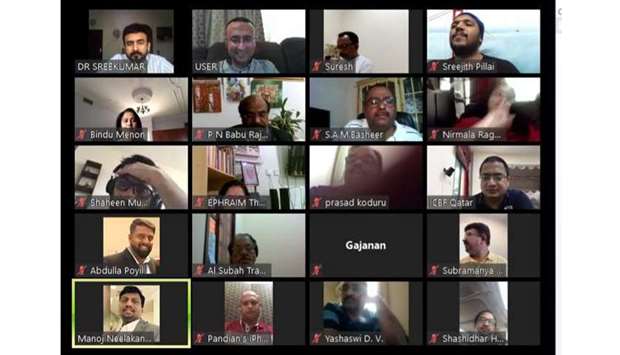The coronavirus pandemic has triggered multiple social and financial issues, ultimately creating mental stress and uncertainty.
While observing social distancing, people may be able to curb the virus outbreak but they find it hard to deal with physical inactivity and mental stress. At this point in time, people need support to stay mentally strong. If an individual is mentally strong, he or she can put up with all sorts of adversaries in life.
The Indian Community Benevolent Forum (ICBF) continues to address the mental health issues at community level by organising online sessions carried out by health experts. The recent session was held on the subject ‘How Physical Fitness Contributes to Mental Strength’. The session was conducted by Dr Sreekumar Padmanabhan and was attended by many members of the community.
Dr Sreekumar is a family medicine specialist with special interest in occupational health practicing for 27 long years. As a faculty of Hamad International Training Centre, he has been teaching courses like advanced life support, immediate trauma life support, major incident medical management & support. A member of the International Association of Study of Obesity UK, Dr Sreekumar has conducted numerous workshops on topics such as physical fitness and well-being, lifestyle diseases and prevention etc.
In his presentation, Dr Sreekumar said: “Stress during an infectious disease outbreak can include: fear and worry about your own health and the health of your loved ones; difficulty in sleeping or concentrating; worsening of chronic health problems; worsening of mental health conditions; and increased use of alcohol, tobacco or other drugs.
Stressing on necessity of physical activity to have better mental health, the expert said: “Research has shown that physical activity releases chemicals like endorphins, dopamine and cortisol in your brain that can improve mental health. It can making you feel better in yourself and give you more energy. Exercise helps in managing stress, anxiety or intrusive and racing thoughts. Being physically active makes your brain more focused and can be a positive coping strategy for difficult times. It also improves sleep by making you feel more tired at the end of the day.”
Explaining physical activity in simple words for his community, he said: “Physical activity is defined as any body movement that works your muscles and requires more energy than resting. Or in simpler terms it means sitting down less and moving our bodies more walking, running, dancing, swimming, yoga and gardening are a few examples of physical activity.
“Typically exercise is a type of physical activity that’s planned and structured. Lifting weights, taking an aerobics class and playing on a sports team are examples of exercise.”
Regarding how active one needs to be, Dr Sreekumar said: “For adults aim is to do at least 30 minutes of moderate intensity activity five times a week. For children and young people (5-18 years), a minimum of 60 minutes per day of moderate to vigorous activity is recommended.
“Moderate intensity activity means being energetic enough that you breathe a little heavier than normal, but aren’t out of breath and feel warmer, but don’t end up hot and sweaty. Vigorous activity includes those that cause you to breathe much harder, your heart to beat rapidly and makes engaging in conversation difficult.”
Explaining what type of activity will work for different people, the health expert said: “Being physically active tends to be easier if you choose an activity that you enjoy, and that fits into your daily life.
“Make exercise a fun part of your everyday life. You don’t have to spend hours in a gym or force yourself into long, monotonous workouts to experience the benefits of exercise.
While observing social distancing, Dr Sreekumar lays stress on the activities that can be done at home. “Try to sit less – if you spend lots of time sitting down, try to get up and move around a bit every hour. If you’re worried you might forget, you could set an alarm to remind yourself.
“Play an active computer game – there are a few different gaming consoles you could try which involve actively moving your body while playing computer games.
“Do chair-based exercises – if you have mobility problems, a physical condition, or find it difficult spending time out of a chair, there are routine exercises that you can try while sitting down itself.”
Sameer Moosa, co-ordinator ICBF Counselling House, said: “The blatant realisation that in a challenging situation as this, mental resilience and positivity can put people through an ultimate test of time, ICBF ensured that we reach out to people. ICBF Counselling House has been working day in and day out to tackle subjects that are most relevant and practical to the current scenario. It has been truly heartening to see that our online sessions ‘Facing Challenges with Positivity’ are meeting the purpose absolutely through expert advice, suggestions and recommendations.”

IN SESSION: The recent session by ICBF was titled ‘How Physical Fitness Contributes to Mental Strength’.


